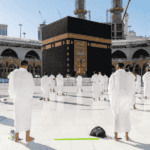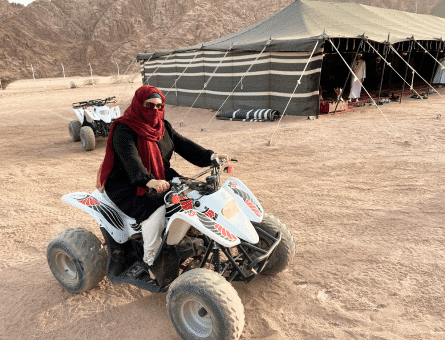Istilam – Meaning & Method for Tawaf in Umrah

In the Name of Allah—the Most Compassionate, Most Merciful.
Imagine arriving in Makkah for umrah, standing before the Kaaba, and feeling the crowd’s energy.
The air is full of movement, prayers, and emotion. And in that moment, your heart longs for a deeper connection. Istilam offers that personal moment.
It’s a simple gesture, not something you have to do, but one that brings you closer to Allah (سُبْحَانَهُ وَتَعَالَى) in a very personal way.
In this quick guide, we’ll walk you through what istilam means, how to do it, the duas to say, and etiquettes, especially if this is your first time performing Umrah.
What Is Istilam in Islam/Umrah?
At its core, “Istilam” refers to the gesture of touching or kissing the Black Stone (Hajar al‑Aswad) at the start and end of every circle (shawt) of tawaf (circumambulating the Kaaba seven times counter-clockwise).
It’s classified in Hanafi fiqh as a sunnah action. Therefore, its absence does not invalidate tawaf, but it reduces the merit.
What Does the Word “Istilam” Mean?
If we leave aside the broader ritual and just zoom in on the word itself, the literal istilam meaning is “touching with the hand or mouth.”
Applying this understanding to the pilgrimage, it refers to the respectful act of either kissing the Black Stone or gesturing toward it from a distance as part of the tawaf ritual.
How to Perform Istilam
To give clear guidance, below is a simple, step-by-step way to understand how istilam is done during tawaf.
- Step 1: Begin where the Black Stone is located and face it.
- Step 2: If you’re close enough, place your hands on the stone and put your face between your hands. If you can’t reach it, just raise your hands toward it, as if you’re doing takbir in prayer.
- Step 3: Say “Allāh Akbar” quietly, then kiss the stone or your palms gently.
- Step 4: Then, begin your first circle of tawaf. Repeat this act at the start of each of the seven rounds.
- Step 5: After the seventh round, do istilam one more time. This makes it the eighth. If you’re still nearby, doing it a ninth time is also considered a sunna.
Istilam Hajar Aswad Dua
Looking closer at the third step, this is the simple and authentic dua to say when you’re making istilām.
(Bismillāhi wa-Llāhu Akbar) – In the name of Allah, and Allah is the Greatest.
This short phrase/dua was taught through the sunnah and is the recommended supplication when touching or gesturing toward the Hajar al-Aswad.
Istilām of the Yemeni Corner (Istilam Rukun Yamani)
Now that we’ve understood istilam in relation to the Black Stone, what about the Rukun Yamani? One of the four corners of the Kaaba, Rukun Yamani (الركن اليماني) is located on its southwestern side, just before the Black Stone. It is called “Yamani” because it faces the direction of Yemen.
Touching the Rukun Yamani during tawaf is considered a sunna act, based on the practice of Prophet Muhammad صَلَّى ٱللَّهُ عَلَيْهِ وَسَلَّمَ.
However, unlike the Black Stone, you should not perform istilam (gesture) from a distance if you can’t reach it. And if you are able to touch it, do so silently without saying Allāh Akbar or kissing it.
Recommended Dua Between Rukn Yamani and the Black Stone
Although there’s no specific prescribed dua for Rukn Yamani, it is sunnah to recite this particular supplication below while walking the short distance (less than a minute) between this corner and the Black Stone.
“رَبَّنَا آتِنَا فِي الدُّنْيَا حَسَنَةً، وَفِي الآخِرَةِ حَسَنَةً، وَقِنَا عَذَابَ النَّارِ”
Rabbana ātinā fid-dunyā ḥasanatan wa fil-ākhirati ḥasanatan wa qinā ‘adhāban-nār
Our Lord, grant us good in this world and good in the Hereafter, and protect us from the punishment of the Fire.
This dua is not part of the istilam itself. This is just an act that emphasises your connection to the Prophetic method of tawaf and adds spiritual value to your Umrah or Hajj.
Istilām of the Black Stone
Circling back, istilam of the Black Stone, or Hajar al‑Aswad, is the starting and ending point of tawaf. Performing istilam there connects you to the prophetic tradition.
Istilam From a Distance
Due to large crowds, especially during peak times, getting close to the Black Stone is often difficult.
If the crowd prevents you from touching the Black Stone, lift your palms towards the stone and kiss your hands after saying Allāh Akbar or the dua mentioned above.
This also clears up a common confusion. Many people wonder if it’s allowed to touch the Kaaba. Here’s your answer below.
Can You Touch the Kaaba During Umrah?
Yes, pilgrims may touch the Kaaba’s marble walls if reachable. This is separate from istilam, which is specifically for the stone or gesture.
In other words, both touching the Kaaba, whether during istilam or at other times, are allowed.
FAQ
Performing umrah is a significant milestone in a Muslim’s life, and it’s natural to have questions while preparing for it.
To help clear up any doubts and guide you through the finer details of istilam and related practices during umrah, here are the answers of a few FAQs.
Summary – Istilam
To summarise, istilam reflects a beautiful moment of worship. It bridges physical ritual and spiritual reverence.
Though it doesn’t make tawaf compulsory, it draws you closer to the tradition of Prophet Muhammad صَلَّى ٱللَّهُ عَلَيْهِ وَسَلَّمَ and invites blessed reward.
Before concluding, here are a few etiquettes to follow while performing istilam.
- Avoid shouting or drawing attention.
Recite Allāh Akbar or the dua softly. Worship is between you and Allah (سُبْحَانَهُ وَتَعَالَى).
- Don’t be rough.
Pushing, shouting, or using force to get closer to the Black Stone contradicts the spirit of Umrah and can harm others.
- Be patient and considerate.
Give space to the elderly, women, and others in need. Help someone instead of competing with them.
- Don’t take selfies or videos during tawaf.
This action distracts one from worship and can disturb others.
May Allah (سُبْحَانَهُ وَتَعَالَى) bless you with the opportunity to touch and kiss the Black Stone and accept every step you take in His path.













